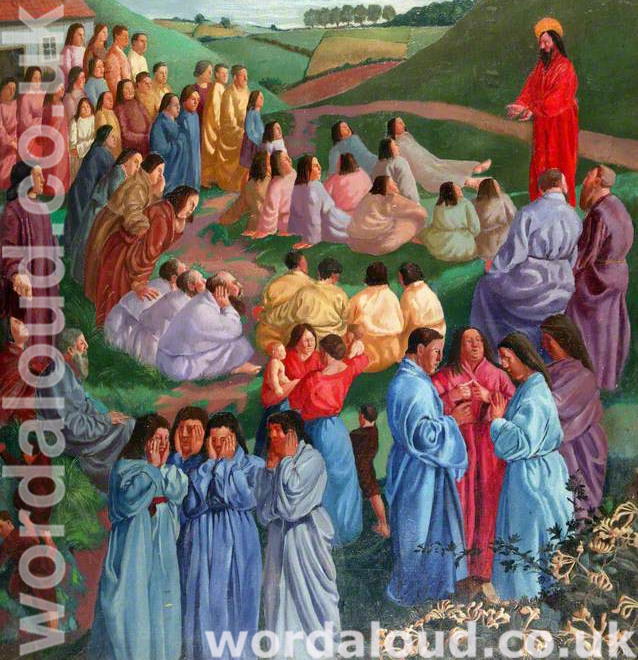Christian Art | A Boy At Prayer With Jesus In The Last Supper | Institution Of The Eucharist | Peace I Leave You, My Peace I Give You
Office Of Readings | Eastertide Week 5, Tuesday | A Reading From The Commentary Of Saint Cyril Of Alexandria On Saint John’s Gospel | Jesus Christ Is The Vine And We Are The Branches
‘I am the vine, you are the branches.’
The Vine And The Branches | Symbol Of Vital Union With Jesus Christ
Christ calling himself the vine and believers branches reveals the nature of our intimate, organic union with Jesus. This image underscores not mere moral imitation, but ontological participation — we share in Christ’s own life. Cyril writes, ‘[T]hose who are joined to him, as branches are to a vine, share in his own nature.’
This is echoed in Saint Paul’s theology of participation: ‘He who is joined to the Lord becomes one spirit with him.’ (1 Corinthians 6:17) The union is real, vital, and transformative — a participation made possible by the Holy Spirit. As the sap flows from the vine to its branches, so grace flows from Christ into the soul.
The Old Testament background strengthens the metaphor. Israel was often referred to as God’s vine (cf. Isaiah 5:1–7; Psalm 80:8–16), but was condemned for its failure to bear fruit. Jesus, the true and faithful vine, succeeds where Israel faltered. Jesus embodies and restores God’s vineyard, fulfilling and transcending the earlier covenant.
Role Of The Holy Spirit In Union With Christ
Cyril emphasizes the Holy Spirit as the bond of union between Christ and his members. This aligns with Augustine’s Trinitarian theology, where the Spirit is the mutual love between the Father and the Son and the one who unites believers with the Triune God. In this way, the Spirit makes divine sonship a lived reality (Romans 8:14–17).
The indwelling of the Spirit, then, is not merely symbolic but the actual means by which we are grafted into Christ. It is the Spirit who makes us ‘living branches’, producing the fruits of the Spirit: love, joy, peace, patience, and more (cf. Galatians 5:22–23). Without the Spirit, Christian life is severed from its source.
Free Will And Grace | A Synergy
Cyril notes that our union with Christ depends both on grace and on human freedom. ‘On the part of those who come to the vine, their union with him depends upon a deliberate act of the will; on his part, the union is effected by grace.’ This articulation of synergy—a cooperation between divine initiative and human response—is a central theme in Eastern Christian theology.
Faith is the ‘yes’ of the believer to God’s gracious invitation. It is by this willful response that we come to Christ, are baptized into him, and become sharers in his divine nature (2 Peter 1:4). This does not mean earning salvation, but remaining in grace through love and obedience: ‘Abide in me, and I in you.’ (John 15:4)
The Church | Temple, Vineyard, Body
Cyril interweaves biblical metaphors to show the ecclesial implications of this union. Christ is not only the vine but the foundation (cf. Isaiah 28:16; 1 Corinthians 3:11), and believers are living stones built into a spiritual temple (1 Peter 2:5). The same divine life that flows into the individual also binds the Church into one mystical body.
This unity is sustained by the Eucharist, the sacrament of love and communion, where we receive Christ’s very Body and Blood — ‘fruit of the vine’ — and are nourished in him. The vine-and-branches image therefore has sacramental dimensions, pointing to the mystery of the Church’s unity in Christ.
Fruitfulness And Spiritual Transformation
Union with Christ is ordered to fruitfulness. As Cyril puts it, we are reborn ‘not to bear the fruit of our old, sinful life, but the fruit of a new life’. This echoes Jesus’ own words: ‘By this my Father is glorified, that you bear much fruit and so prove to be my disciples.’ (John 15:8)
Such fruitfulness is the evidence of sanctification. Gregory of Nyssa described the Christian journey as continual growth in virtue — from glory to glory. Likewise, Teresa of Ávila and John of the Cross emphasized that the soul, united to Christ, becomes like a fruitful vineyard cultivated by divine grace.
Moral Vigilance And Fidelity
Finally, Cyril exhorts believers to remain vigilant: ‘We are careful not to grieve the Holy Spirit who dwells in us.’ This recalls Paul’s exhortation in Ephesians 4:30, and highlights the ongoing moral and spiritual effort needed to remain united to Christ.
Spiritual fruit can only grow in a soul that abides in Christ’s commandments (John 15:10). Therefore, the Christian life involves ongoing discernment, moral integrity, and spiritual discipline — all aimed at preserving the divine life received through faith.

A Reading From The Commentary Of Saint Cyril Of Alexandria On Saint John’s Gospel
The Lord calls himself the vine and those united to him branches in order to teach us how much we shall benefit from our union with him, and how important it is for us to remain in his love. By receiving the Holy Spirit, who is the bond of union between us and Christ our Saviour, those who are joined to him, as branches are to a vine, share in his own nature.
On the part of those who come to the vine, their union with him depends upon a deliberate act of the will; on his part, the union is effected by grace. Because we had good will, we made the act of faith that brought us to Christ, and received from him the dignity of adoptive sonship that made us his own kinsmen, according to the words of Saint Paul: He who is joined to the Lord is one spirit with him.
The prophet Isaiah calls Christ the foundation, because it is upon him that we as living and spiritual stones are built into a holy priesthood to be a dwelling place for God in the Spirit. Upon no other foundation than Christ can this temple be built. Here Christ is teaching the same truth by calling himself the vine, since the vine is the parent of its branches, and provides their nourishment.
From Christ and in Christ, we have been reborn through the Spirit in order to bear the fruit of life; not the fruit of our old, sinful life but the fruit of a new life founded upon our faith in him and our love for him. Like branches growing from a vine, we now draw our life from Christ, and we cling to his holy commandment in order to preserve this life. Eager to safeguard the blessing of our noble birth, we are careful not to grieve the Holy Spirit who dwells in us, and who makes us aware of God’s presence in us.
Let the wisdom of John teach us how we live in Christ and Christ lives in us: The proof that we are living in him and he is living in us is that he has given us a share in his Spirit. Just as the trunk of the vine gives its own natural properties to each of its branches, so, by bestowing on them the Holy Spirit, the Word of God, the only-begotten Son of the Father, gives Christians a certain kinship with himself and with God the Father because they have been united to him by faith and determination to do his will in all things. He helps them to grow in love and reverence for God, and teaches them to discern right from wrong and to act with integrity.

Glossary Of Terms
- Ontological
- Definition: Relating to the nature of being or existence.
- Context: When we speak of an ‘ontological union’ with Christ, we mean a real and substantial sharing in His divine life—not just symbolic or metaphorical.
- Organic Union
- Definition: A living, natural connection as between parts of a living organism.
- Context: The image of vine and branches suggests that our connection with Christ is vital and life-sustaining, not mechanical or legalistic.
- Synergy
- Definition: Cooperation between divine grace and human freedom in salvation.
- Context: In Eastern Christian theology (and affirmed in Catholic teaching), salvation is not forced by God but involves our willing response to His grace.
- Grace
- Definition: The free and unmerited favor of God, particularly in the help given for salvation and sanctification.
- Context: Union with Christ is made possible by grace — a divine gift rather than something we can achieve ourselves.
- The Holy Spirit
- Definition: The third Person of the Holy Trinity, the bond of love between the Father and the Son, and the sanctifier of souls.
- Context: The Holy Spirit unites believers to Christ and dwells within them, empowering their growth in holiness and love.
- Adoptive Sonship
- Definition: The theological concept that through faith and baptism, Christians become children of God, sharing in Christ’s relationship with the Father.
- Context: By joining ourselves to Christ, we are adopted into God’s family and called sons and daughters of the Father.
- Eucharist
- Definition: The sacrament in which the Body and Blood of Christ are made present under the appearances of bread and wine.
- Context: The Eucharist is often understood as the nourishment that strengthens and sustains our union with Christ, the true Vine.
- Ecclesial
- Definition: Pertaining to the Church.
- Context: The vine and branches image has ecclesial meaning: all believers are united to one another through their shared life in Christ.
- Fruitfulness (Spiritual)
- Definition: The visible result of spiritual growth in a Christian, shown through virtues and good works.
- Context: Jesus teaches that true disciples will bear fruit — that is, their lives will reflect love, holiness, and service.
- Indwelling
- Definition: The presence of the Holy Spirit residing within the believer.
- Context: The Spirit doesn’t merely visit, but abides in the soul, making union with Christ personal and ongoing.
- Discernment
- Definition: The process of seeking and recognizing God’s will in specific circumstances.
- Context: Remaining in Christ requires continual discernment to stay rooted in truth and to act in love and wisdom.
- Patristic
- Definition: Relating to the early Church Fathers (Patres), whose theological writings shaped Christian doctrine.
- Context: Saint Cyril, as one of the Fathers, provides a patristic lens on Scripture — rich in both theology and spiritual insight.
- Mystical Body of Christ
- Definition: A term used by St. Paul to describe the Church as a living organism with Christ as its head and believers as its members.
- Context: The vine and branches metaphor echoes this imagery: all believers are united in one spiritual body with Christ as the source.








